Sweet onions are not only delicious but also offer a range of health benefits. In this comprehensive guide, we will delve into the world of sweet onion carbs, exploring their nutritional value and calorie content.
- Sweet onions contain about 10 grams of carbohydrates per medium-sized onion.
- They have a low glycemic index and minimal impact on blood sugar levels.
- Sweet onions are a good source of vitamin C, vitamin B6, folate, potassium, and manganese.
- They are rich in phytochemicals that can help prevent heart disease and cancer.
- Sweet onions can improve weight management, sperm function, and cognitive function.
Sweet Onion Carbs and Nutritional Value
Sweet onions are packed with nutrients that make them a valuable addition to any diet. Let’s take a closer look at their carb content and nutritional value:
- Carbohydrates: A medium-sized sweet onion contains about 10 grams of carbohydrates. These carbs are primarily in the form of natural sugars, with 4.7 grams of sugar per onion.
- Fiber: Sweet onions also provide 1.9 grams of fiber per serving, aiding in digestion and promoting a healthy gut.
- Glycemic Index: With a low glycemic index, sweet onions have minimal impact on blood sugar levels, making them a suitable choice for individuals with diabetes or those following a low glycemic diet.
In addition to their carb content, sweet onions offer a range of important vitamins and minerals:
- Vitamin C: One medium-sized sweet onion provides approximately 10% of the daily recommended intake of vitamin C, supporting a healthy immune system and collagen production.
- Vitamin B6: Sweet onions are a good source of vitamin B6, which is essential for brain development and function, as well as the production of red blood cells.
- Folate: Folate, or vitamin B9, is important for cell growth and metabolism. Sweet onions contain a moderate amount of folate.
- Potassium: Sweet onions are rich in potassium, an essential mineral that helps regulate blood pressure, maintain fluid balance, and support muscle function.
- Manganese: Manganese is vital for bone health, the metabolism of carbohydrates, and the production of collagen. Sweet onions provide a small amount of this essential mineral.
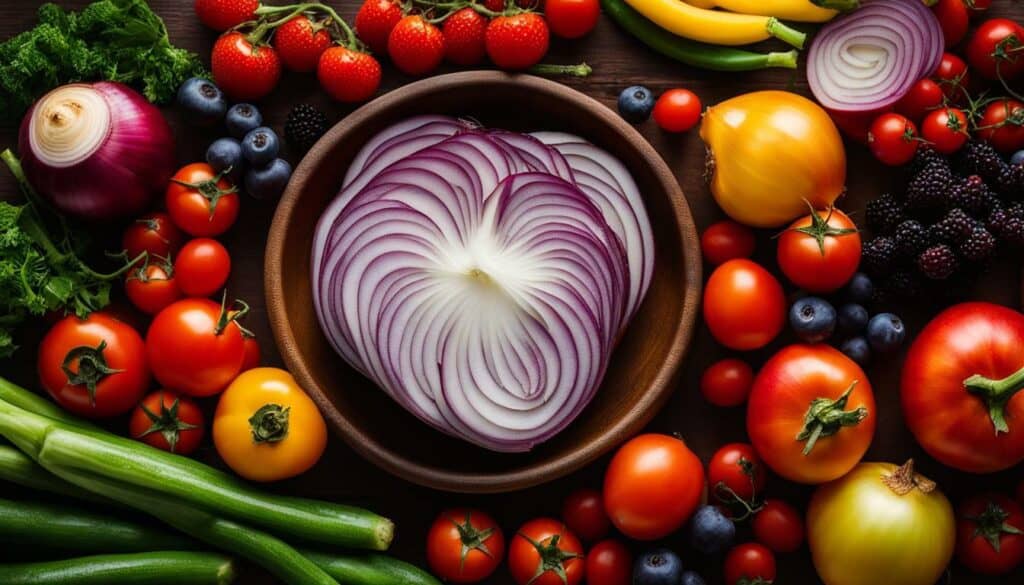
The phytochemicals found in sweet onions contribute to their numerous health benefits. These compounds have antioxidant and anti-inflammatory effects, which can help prevent chronic diseases such as heart disease and certain types of cancer. Sweet onions are also known to improve weight management, as they are low in calories and high in flavor.
Furthermore, studies have suggested that the sulfur compounds in onions may enhance sperm function and promote better cognitive function. However, it’s important to note that some individuals may have allergies to onions or experience eye and mouth irritation when handling or consuming them. If you have any concerns or experience adverse reactions, it’s best to consult with a healthcare professional.
Understanding Sweet Onion Carb Content
If you’re looking for a low carb vegetable that adds flavor to your meals, sweet onions are an excellent choice. Let’s explore their carb content and their role in weight loss.
Sweet onions have become increasingly popular for their milder taste compared to other varieties of onions. Not only do they enhance the flavor of your dishes, but they also offer several health benefits. When it comes to carbohydrates, sweet onions are relatively low in content, making them suitable for those following a low carb diet or looking to manage their weight.
In a medium-sized sweet onion, you can expect to find about 10 grams of carbohydrates, with 4.7 grams of sugar and 1.9 grams of fiber. This combination of sugar and fiber helps regulate blood sugar levels, preventing sudden spikes and crashes that can lead to cravings or energy dips. The low glycemic index of sweet onions further contributes to their minimal impact on blood sugar levels, making them a great choice for individuals with diabetes or those following a low glycemic diet.
| Nutrient | Amount per Medium-Sized Sweet Onion |
|---|---|
| Vitamin C | 10% of the Daily Value |
| Vitamin B6 | 8% of the Daily Value |
| Folate | 7% of the Daily Value |
| Potassium | 5% of the Daily Value |
| Manganese | 5% of the Daily Value |
Aside from their low carb content, sweet onions are also packed with essential vitamins and minerals. They are a good source of vitamin C, which boosts the immune system and promotes collagen production. Additionally, they contain vitamin B6, folate, potassium, and manganese, which play important roles in supporting overall health and well-being.
So, if you’re looking to add flavor to your meals while keeping your carb intake in check, sweet onions are a fantastic choice. Their low carb content, along with their numerous health benefits and versatility in cooking, make them a nutritious addition to any diet.

Sweet onions have a low glycemic index, meaning they have minimal impact on blood sugar levels. Let’s explore why they are a healthy choice for individuals concerned about blood sugar management.
When it comes to managing blood sugar levels, it’s essential to choose foods that have a low glycemic index. The glycemic index (GI) measures how quickly a carbohydrate-containing food raises blood sugar levels. Foods with a high GI can cause rapid spikes in blood sugar, potentially leading to energy crashes and cravings. On the other hand, foods with a low GI release sugar into the bloodstream more gradually, promoting stable energy levels and satiety.
Sweet onions, with their natural sweetness and mild flavor, have a GI of around 32, making them a favorable choice for individuals with diabetes or those following a low glycemic diet. Their low GI value means they are digested and absorbed slowly, resulting in a slower rise in blood sugar.
By incorporating sweet onions into your meals, you can enjoy their delicious taste while maintaining stable blood sugar levels. They can be added to salads, stir-fries, or roasted dishes, enhancing flavor and providing essential nutrients without causing blood sugar spikes.
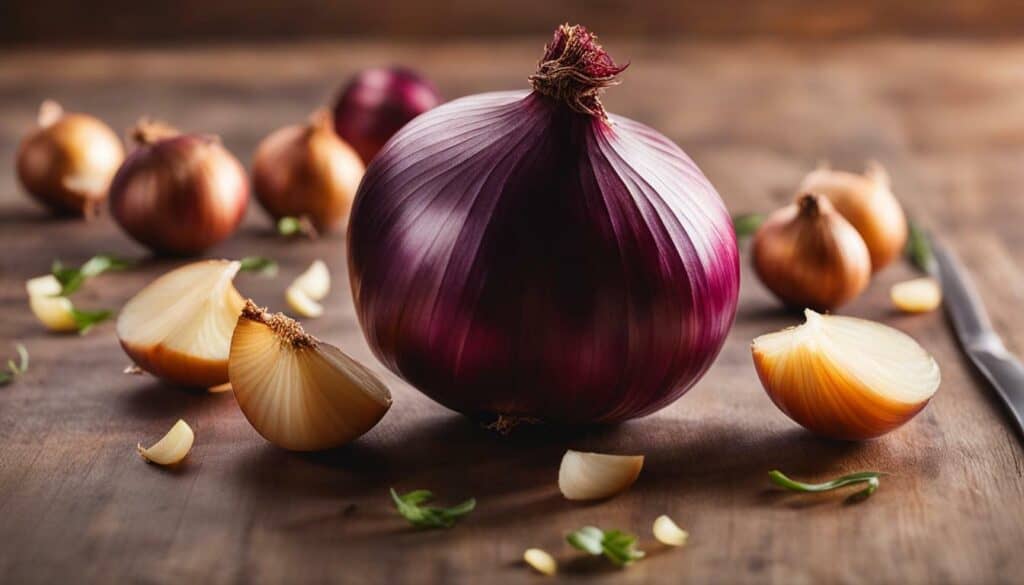
Sweet Onion Health Benefits
Alongside their delicious taste, sweet onions offer an array of health benefits that make them a valuable addition to any diet. Let’s explore the specific advantages they bring to the table.
- Heart Health: Sweet onions contain flavonoids and antioxidants that can help reduce the risk of heart disease. They can lower cholesterol levels and blood pressure, keeping your heart healthy and strong.
- Cancer Prevention: The organosulfur compounds found in sweet onions have been linked to a reduced risk of certain types of cancer, including gastric, colorectal, and prostate cancers. These compounds have anti-cancer properties and help inhibit the growth of cancer cells.
- Weight Management: With their low calorie and fat content, sweet onions are an excellent choice for those looking to maintain a healthy weight. They provide flavor and satisfaction to meals without adding excessive calories, making weight management easier.
Furthermore, sweet onions offer additional benefits such as improved sperm function and enhanced cognitive function. The antioxidants in sweet onions can protect sperm from oxidative damage, improving fertility. Additionally, the nutrients found in sweet onions, including vitamins C and B6, folate, potassium, and manganese, support brain health and cognitive function.
So, whether you’re looking to protect your heart, reduce the risk of cancer, manage your weight, or improve your overall health, sweet onions are a versatile and nutritious choice. Incorporate them into your meals for their delicious flavor and the numerous health benefits they provide.
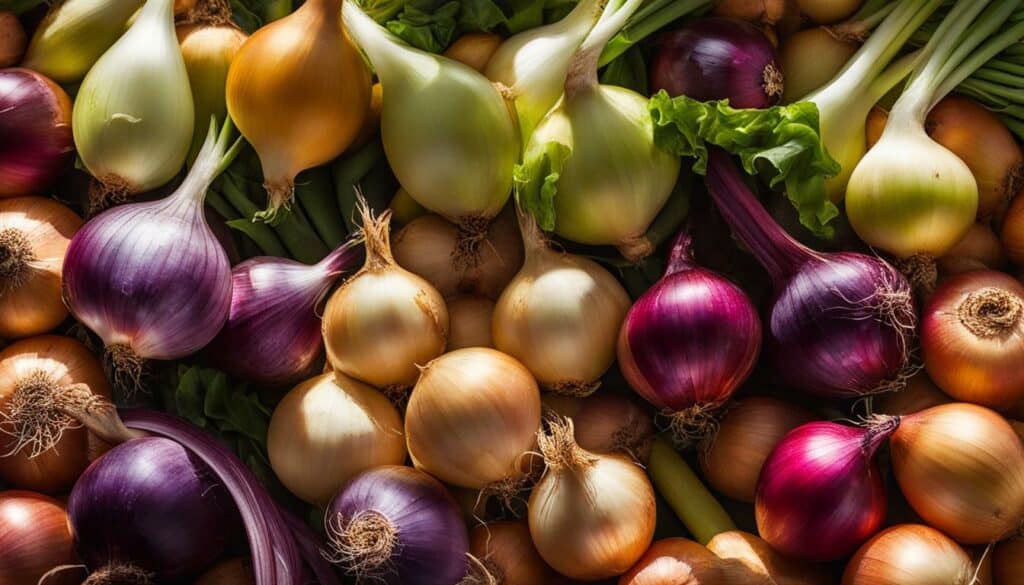
| Nutrient | Amount per Medium-Sized Onion |
|---|---|
| Carbohydrates | 10 grams |
| Sugar | 4.7 grams |
| Fiber | 1.9 grams |
| Vitamin C | 9% of the Daily Value |
| Vitamin B6 | 6% of the Daily Value |
| Folate | 5% of the Daily Value |
| Potassium | 5% of the Daily Value |
| Manganese | 5% of the Daily Value |
Nutrients in Sweet Onions
Sweet onions are not only low in carbs but also rich in essential nutrients that support overall health. Let’s take a closer look at their nutritional profile.
One medium-sized sweet onion contains approximately 10 grams of carbohydrates, with 4.7 grams of sugar and 1.9 grams of fiber. This makes sweet onions a great option for those looking to manage their carb intake or follow a low-carb diet. The fiber content also helps promote a healthy digestive system and can contribute to feelings of fullness, aiding in weight management.
Aside from being low in calories and fat, sweet onions are packed with vitamins and minerals. They are a good source of vitamin C, which supports immune function and helps the body absorb iron. Sweet onions also provide vitamin B6, which plays a crucial role in brain development and function. Additionally, they contain folate, potassium, and manganese, which are important for various bodily functions.
| Nutrient | Amount per Medium-sized Sweet Onion (Approx.) |
|---|---|
| Vitamin C | 15% of the Daily Value (DV) |
| Vitamin B6 | 10% of the DV |
| Folate | 8% of the DV |
| Potassium | 6% of the DV |
| Manganese | 6% of the DV |
Sweet onions are a nutritional powerhouse, offering a range of vitamins and minerals that can contribute to overall well-being.
Furthermore, sweet onions contain phytochemicals such as quercetin and organosulfur compounds, which have been linked to various health benefits. These compounds act as antioxidants, protecting the body against harmful free radicals and reducing the risk of chronic diseases like heart disease and certain types of cancer.
It’s important to note that while onions can provide numerous health benefits, some individuals may experience allergies or sensitivity to onions. This can manifest as skin rashes, respiratory issues, or digestive discomfort. If you suspect an onion allergy, it is best to consult with a healthcare professional for proper diagnosis and guidance.
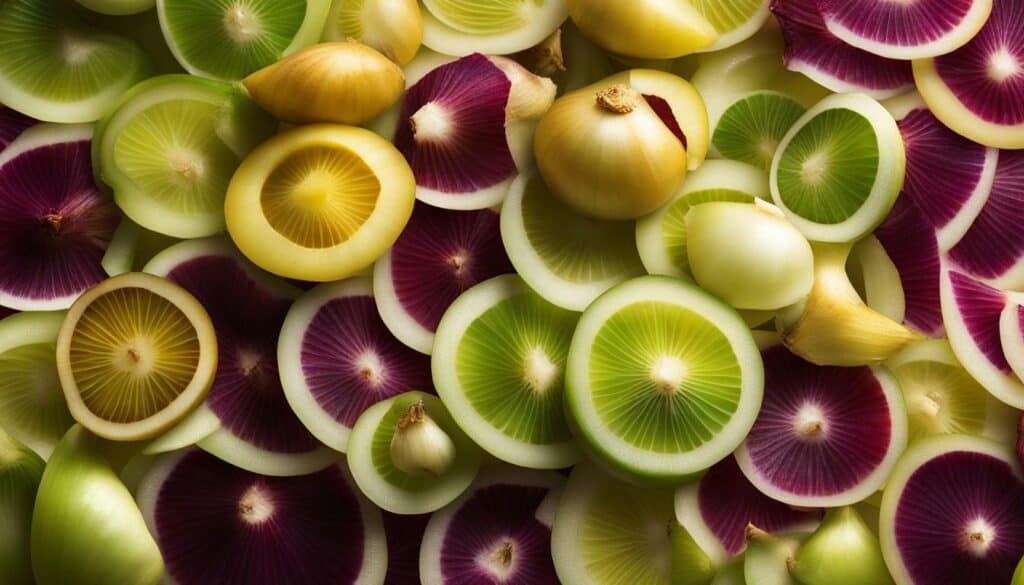
Sweet onions can be prepared and cooked in numerous ways, allowing you to incorporate them into a variety of dishes. Let’s explore some techniques for getting the most out of sweet onions in your cooking.
1. Sautéing: Sautéing sweet onions brings out their natural sweetness and adds depth of flavor to any dish. Start by thinly slicing the onions and heating a tablespoon of olive oil or butter in a skillet over medium heat. Add the onions and cook until they become translucent and caramelized, stirring occasionally. This method works well for adding a rich flavor to soups, stews, stir-fries, and pasta dishes.
2. Grilling: Grilling sweet onions gives them a smoky and slightly charred taste, making them a perfect addition to summer barbecues. To grill sweet onions, cut them into thick slices or quarters and brush them with olive oil. Place the onions directly on a hot grill and cook for about 5-6 minutes per side until they are tender and grill marks appear. Grilled sweet onions are delicious on their own as a side dish or as a topping for burgers, sandwiches, or salads.
3. Caramelizing: Caramelized sweet onions are a heavenly addition to many dishes, adding a rich and sweet flavor. To caramelize sweet onions, thinly slice them and heat a mixture of butter and olive oil in a large skillet over low heat. Add the onions and cook slowly, stirring occasionally, until they turn a deep golden brown color. This process can take anywhere from 30 minutes to an hour, but the result is well worth the patience. Caramelized sweet onions can be used as a topping for pizzas, in French onion soup, or as a flavor base for sauces and gravies.
Remember, the key to getting the best flavor out of sweet onions is to cook them slowly and let them develop their natural sweetness. So, don’t rush the process and enjoy the delicious aroma that fills your kitchen as the onions cook.

| Cooking Method | Description |
|---|---|
| Sautéing | Thinly slice the onions and cook them in a skillet with oil or butter until translucent and caramelized. Great for adding flavor to various dishes. |
| Grilling | Cut the onions into slices or quarters, brush with olive oil, and cook them on a hot grill until tender and charred. Perfect for barbecues and as a topping. |
| Caramelizing | Thinly slice the onions and cook them slowly with butter and oil until they turn golden brown. Ideal for adding a rich and sweet flavor to recipes. |
Other Varieties of Onions
While sweet onions are a popular choice, there are other onion varieties that offer unique flavors and uses. Let’s explore the different characteristics of yellow, red, and green onions.
1. Yellow Onions: Yellow onions are the most commonly used onions in cooking. They have a strong, pungent flavor and a slightly sweet taste when caramelized. Yellow onions are versatile and can be used in a variety of dishes, including soups, stews, and stir-fries. They are often the base for many recipes due to their rich flavor.
2. Red Onions: Known for their vibrant color, red onions have a milder flavor compared to yellow onions. They have a slightly sweet and tangy taste, making them a popular choice for raw dishes like salads, sandwiches, and salsas. Red onions are also great for pickling due to their crisp texture.
3. Green Onions: Also known as scallions, green onions have a mild flavor with a hint of oniony sharpness. They have long, green stalks and small white bulbs. Green onions are commonly used as a garnish in various Asian cuisines, but they can also be added to salads, stir-fries, and soups for a fresh, onion-like taste.
| Type of Onion | Flavor | Uses |
|---|---|---|
| Yellow Onions | Strong, pungent, slightly sweet (when caramelized) | Soups, stews, stir-fries, as a base for many recipes |
| Red Onions | Mild, slightly sweet, tangy | Raw dishes like salads, sandwiches, salsas, pickling |
| Green Onions (Scallions) | Mild, with a hint of oniony sharpness | Garnish, salads, stir-fries, soups |
Whether you’re looking to add depth to your cooking with the robust flavor of yellow onions, add a pop of color and mildness with red onions, or enjoy the fresh taste of green onions, these onion varieties offer unique characteristics that can elevate your dishes.
“The different varieties of onions not only add flavor to our meals but also provide various health benefits. Including a variety of onions in our diet allows us to enjoy their distinct tastes while benefiting from their nutrients.”
Image:
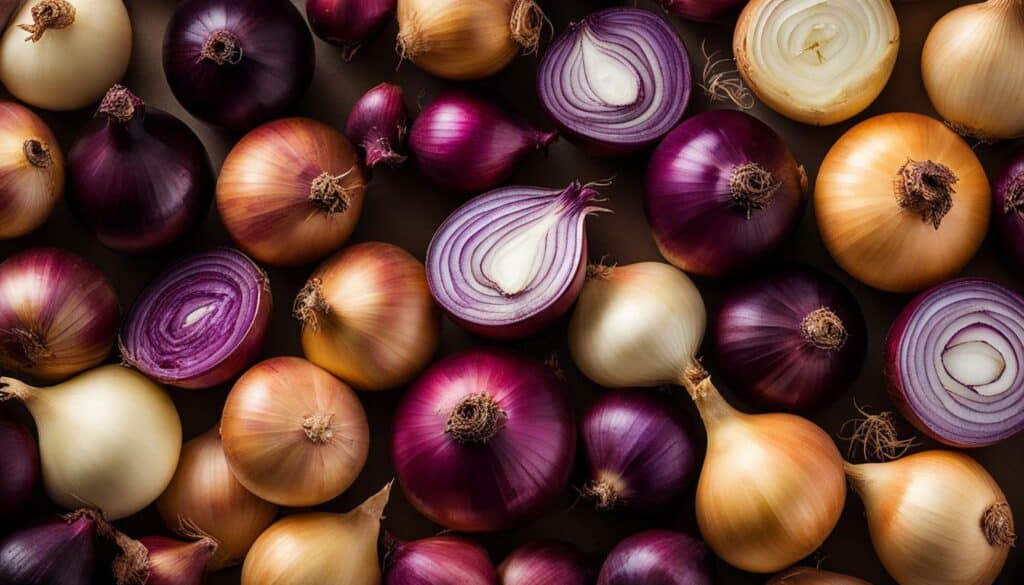
While onions offer numerous health benefits, it’s important to be aware of potential allergies and side effects. Let’s explore the common symptoms and precautions related to onion consumption.
For some individuals, onions can cause allergic reactions, which may range from mild to severe. Common symptoms of an onion allergy include watery eyes, a runny nose, sneezing, coughing, and skin rashes. In more severe cases, individuals may experience difficulty breathing or swallowing, chest tightness, and swelling of the face, lips, tongue, or throat. If you suspect you have an onion allergy, it’s essential to consult with a healthcare professional for proper diagnosis and guidance.
In addition to allergies, onions can sometimes cause irritation to the eyes and mouth. When cutting onions, a volatile compound called syn-propanethial-S-oxide is released, which can cause tears and stinging sensations in the eyes. Some individuals may also experience tongue or gum irritation after consuming raw onions. To minimize eye irritation, you can try chilling the onion in the refrigerator or using a sharp knife to minimize the release of the irritating compounds.
It’s important to note that not everyone will experience allergies or side effects from onions. Many individuals can enjoy the numerous health benefits of onions without any adverse reactions. However, if you have a known allergy or sensitivity, it’s best to avoid onions or seek guidance from a healthcare professional. Understanding your body’s response to onion consumption can help you make informed choices for a healthy and enjoyable diet.
Remember to always listen to your body and consult with a healthcare professional if you have any concerns or questions regarding the consumption of onions or any other food.
To ensure you can enjoy the full flavor and nutritional benefits of sweet onions, proper storage is key. Let’s explore the best practices for storing sweet onions.
Sweet onions should be stored in a cool, dry, and well-ventilated area. Avoid storing them near potatoes, as the moisture from the potatoes can cause the onions to spoil faster. A pantry or cellar is an ideal location for storing sweet onions.
If you have cut sweet onions and want to store them for later use, wrap them tightly in plastic wrap or place them in an airtight container. This will help prevent them from absorbing moisture and developing a strong odor in the refrigerator. Stored this way, sweet onions can last for up to a week in the fridge.
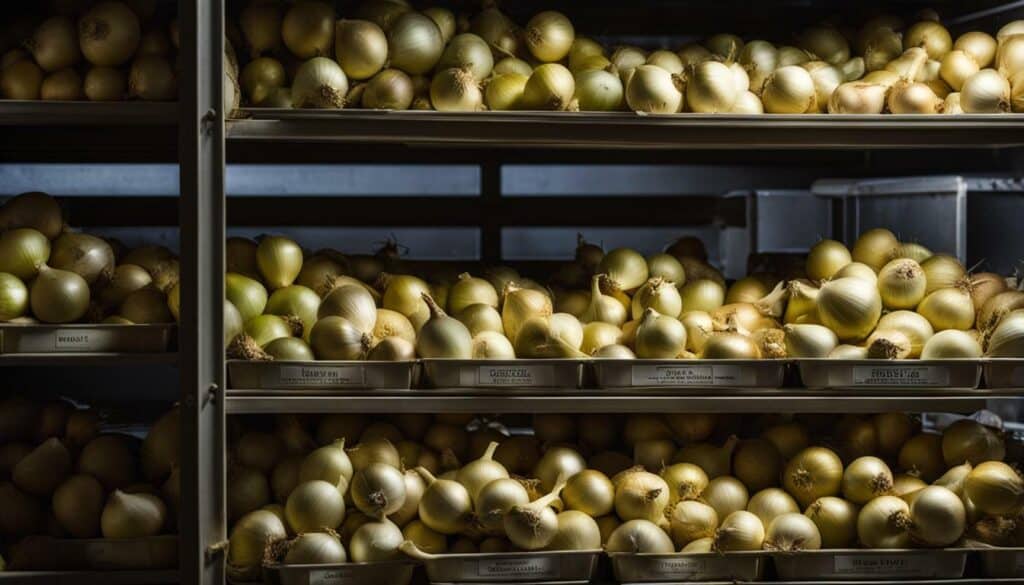
Another option for storing sweet onions is to freeze them. Start by peeling and chopping the onions into small pieces. Spread the chopped onions in a single layer on a baking sheet and place it in the freezer. Once the onions are frozen, transfer them to a freezer-safe bag or container. Frozen sweet onions can be stored for up to three months. However, keep in mind that freezing can alter the texture of the onions, so they may be better suited for cooked dishes.
| Storage Method | Shelf Life |
|---|---|
| Room temperature | 2-3 weeks |
| Refrigerator | Up to 1 week |
| Freezer | Up to 3 months |
By following these storage tips, you can ensure that your sweet onions stay fresh and flavorful, ready to add a delicious touch to your favorite dishes.
Sweet Onions and Cognitive Function
Did you know that sweet onions can potentially boost cognitive function and support brain health? Let’s explore the connection between sweet onions and our mental well-being.
Sweet onions are not only delicious but also packed with nutrients that can benefit our brain. They contain quercetin, a flavonoid that has been linked to improved cognitive function. Quercetin acts as an antioxidant, protecting our brain cells from oxidative stress and inflammation. It also enhances blood flow to the brain, improving memory and overall cognitive performance.
Moreover, sweet onions are a rich source of vitamin C, which plays a crucial role in brain health. Vitamin C is known for its antioxidant properties, reducing the risk of cognitive decline and supporting neurotransmitter function. It also helps in the production of collagen, a protein that forms the structure of our brain cells.
| Nutrient | Sweet Onions |
|---|---|
| Vitamin C | 11% of the recommended daily intake |
| Quercetin | Beneficial for brain health |
| Potassium | 4% of the recommended daily intake |

In addition to their cognitive benefits, sweet onions offer a range of other health benefits. They are low in calories and fat, making them an excellent choice for weight management. Sweet onions also contain prebiotic fibers that promote a healthy gut microbiome, which is important for overall well-being.
Whether you enjoy them raw in salads or cooked in your favorite dishes, sweet onions provide a flavorful and nutritious addition to your diet. So next time you’re at the grocery store, don’t forget to grab a few sweet onions and give your brain a boost!
Conclusion
In conclusion, sweet onions are an excellent choice for those seeking a nutritious vegetable that adds flavor to a variety of dishes. With their low carb content, impressive nutritional profile, and numerous health benefits, they are a valuable addition to any diet. Start incorporating sweet onions into your meals and unlock the benefits they have to offer.
When it comes to carbs, sweet onions contain about 10 grams per medium-sized onion, with 4.7 grams of sugar and 1.9 grams of fiber. This makes them a satisfying and filling option, without causing spikes in blood sugar levels. Sweet onions are also packed with vitamins and minerals, including vitamin C, vitamin B6, folate, potassium, and manganese.
But the benefits of sweet onions go beyond their nutritional content. They are rich in phytochemicals, which have been shown to have anti-inflammatory and antioxidant properties. These compounds contribute to improved heart health, cancer prevention, and weight management.
Furthermore, sweet onions have been linked to cognitive benefits, helping to support brain health and function. They can also enhance sperm function in men. However, it’s important to note that some individuals may have allergies or experience irritation when handling or consuming onions.
Fortunately, there are numerous ways to enjoy sweet onions. They can be stored in a cool, dry place, and are versatile in various cooking methods. Whether you prefer them raw in salads, caramelized in dishes, or sautéed as a flavorful addition to your favorite recipes, sweet onions add depth and complexity to any meal.
Incorporating sweet onions into your diet not only enhances the taste of your dishes, but also provides an array of health benefits. With their rich nutritional profile, low carb content, and delicious flavor, sweet onions are a staple ingredient that can elevate your culinary creations while nourishing your body.
FAQ
Q: What is the carb content of sweet onions?
A: Sweet onions contain about 10 grams of carbohydrates per medium-sized onion.
Q: How much sugar do sweet onions have?
A: Each medium-sized sweet onion contains approximately 4.7 grams of sugar.
Q: What is the fiber content of sweet onions?
A: Sweet onions provide 1.9 grams of fiber per medium-sized onion.
Q: Do sweet onions have a high glycemic index?
A: No, sweet onions have a low glycemic index and have minimal impact on blood sugar levels.
Q: What nutrients are found in sweet onions?
A: Sweet onions are a good source of vitamin C, vitamin B6, folate, potassium, and manganese.
Q: Do sweet onions have any health benefits?
A: Yes, sweet onions contain phytochemicals that can help prevent heart disease and cancer. They can also improve weight management, sperm function, and cognitive function.
Q: Can some people be allergic to onions?
A: Yes, some individuals may have allergies or experience eye and mouth irritation when handling or consuming onions.
Q: How should sweet onions be stored?
A: Sweet onions should be stored in a cool, dry place away from sunlight. They can last for several weeks when stored properly.
Q: How can sweet onions be prepared and cooked?
A: Sweet onions can be sliced, diced, or caramelized for various dishes. They can be consumed raw in salads or cooked in stir-fries, soups, and stews.
Q: What are some other varieties of onions?
A: Other varieties of onions include yellow, red, and green onions, each offering different flavors and culinary uses.
How Does Sweet Onion Nutrient Benefit Your Health?
Sweet onions, a delightful addition to any meal, offer several benefits of sweet nutrient. Packed with antioxidants and vitamins, these onions provide immune system support and aid in detoxification. Additionally, their anti-inflammatory properties promote heart health and may lower the risk of certain cancers. Enjoy the delectable flavor of sweet onions while fueling your body with valuable nutrients.

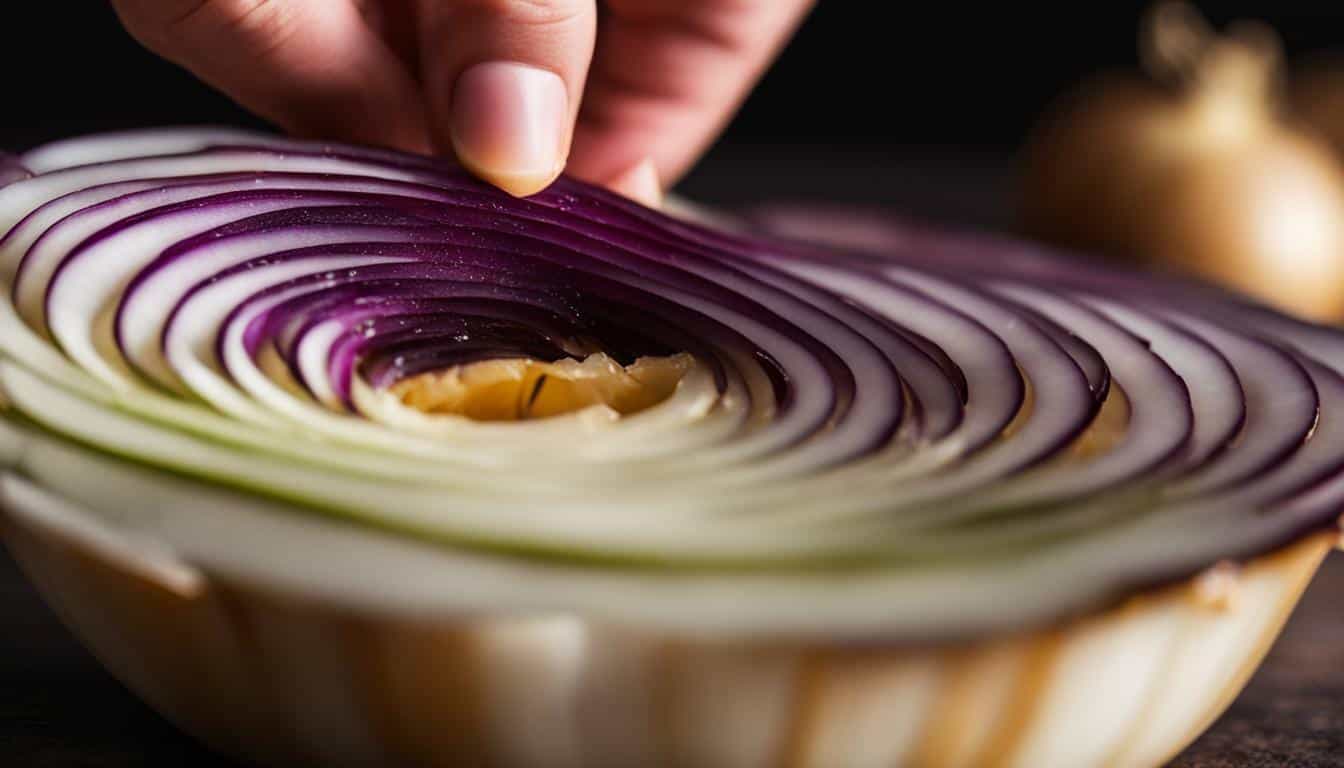



Leave a Reply